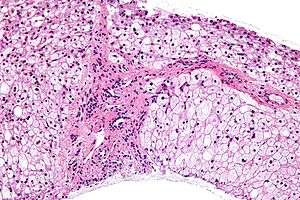Glycogen storage disease
| Glycogen storage disease | |
|---|---|
 | |
| Glycogen | |
| Classification and external resources | |
| Specialty | endocrinology |
| ICD-10 | E74.0 |
| ICD-9-CM | 271.0 |
| MeSH | D006008 |
Glycogen storage disease (GSD, also glycogenosis and dextrinosis) is the result of defects in the processing of glycogen synthesis or breakdown within muscles, liver, and other cell types.[1]
GSD has two classes of cause: genetic and acquired. Genetic GSD is caused by any inborn error of metabolism (genetically defective enzymes) involved in these processes. In livestock, acquired GSD is caused by intoxication with the alkaloid castanospermine.[2]
Prevalence
Overall, according to a study in British Columbia, approximately 2.3 children per 100 000 births (1 in 43,000) have some form of glycogen storage disease.[3] In the United States, they are estimated to occur in 1 per 20,000-25,000 births.[4] A Dutch study estimated it to be 1 in 40,000.[5]
Types

There are eleven (11) distinct diseases that are commonly considered to be glycogen storage diseases (some previously thought to be distinct have been reclassified). (Although glycogen synthase deficiency does not result in storage of extra glycogen in the liver, it is often classified with the GSDs as type 0 because it is another defect of glycogen storage and can cause similar problems.)..
- GSD type VIII: In the past, considered a distinct condition.[6] Now classified with VI.[7] Has been described as X-linked recessive.[8]
- GSD type X: In the past, considered a distinct condition.[9][10] Now classified with VI.[7]
References
- ↑ "glycogen storage disease" at Dorland's Medical Dictionary
- ↑ Stegelmeier BL, Molyneux RJ, Elbein AD, James LF (May 1995). "The lesions of locoweed (Astragalus mollissimus), swainsonine, and castanospermine in rats". Veterinary Pathology. 32 (3): 289–98. doi:10.1177/030098589503200311. PMID 7604496.
- ↑ Applegarth DA, Toone JR, Lowry RB (January 2000). "Incidence of inborn errors of metabolism in British Columbia, 1969-1996". Pediatrics. 105 (1): e10. doi:10.1542/peds.105.1.e10. PMID 10617747.
- 1 2 eMedicine Specialties > Glycogen-Storage Disease Type I Author: Karl S Roth. Updated: Aug 31, 2009
- 1 2 Ausems MG, Verbiest J, Hermans MP, et al. (September 1999). "Frequency of glycogen storage disease type II in The Netherlands: implications for diagnosis and genetic counselling". Eur. J. Hum. Genet. 7 (6): 713–6. doi:10.1038/sj.ejhg.5200367. PMID 10482961.
- ↑ Ludwig M, Wolfson S, Rennert O (October 1972). "Glycogen storage disease, type 8". Arch. Dis. Child. 47 (255): 830–3. doi:10.1136/adc.47.255.830. PMC 1648209
 . PMID 4508182.
. PMID 4508182. - 1 2 "eMedicine - Glycogen-Storage Disease Type VI : Article by Lynne Ierardi-Curto".
- ↑ "Definition: glycogen storage disease type VIII from Online Medical Dictionary".
- ↑ Warren MF, Hamilton PB (January 1981). "Glycogen storage disease type X caused by ochratoxin A in broiler chickens". Poult. Sci. 60 (1): 120–3. doi:10.3382/ps.0600120. PMID 6940112.
- ↑ Huff WE, Doerr JA, Hamilton PB (January 1979). "Decreased glycogen mobilization during ochratoxicosis in broiler chickens". Appl. Environ. Microbiol. 37 (1): 122–6. PMC 243410
 . PMID 760630.
. PMID 760630. - ↑ The Association for Glycogen Storage Disease > Type I Glycogen Storage Disease Type I GSD This page was created in October 2006.
- 1 2 3
- ↑ http://mcardlesdisease.org/
- ↑ eMedicine Specialties > Pediatrics: Genetics and Metabolic Disease > Metabolic Diseases > Glycogen-Storage Disease Type VI Author: Lynne Ierardi-Curto, MD, PhD. Updated: Aug 4, 2008
- ↑ Goldman, Lee; Schafer, Andrew (2012). Goldman's Cecil medicine (24th ed.). Philadelphia: Elsevier/Saunders. p. 1356. ISBN 978-1-4377-1604-7.
- ↑ "Rare Disease Database". Orpha.net. Retrieved 2015-09-20.
- 1 2 http://neuromuscular.wustl.edu/msys/glycogen.html#enolase
External links
- Dietary Management of Glycogen Storage Disease (GSD)
- Asociación Española de Enfermos de Glucogenosis